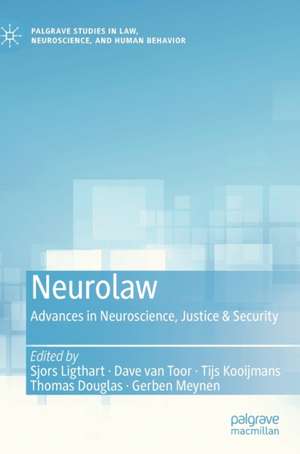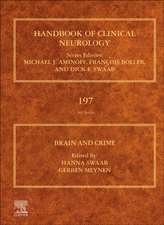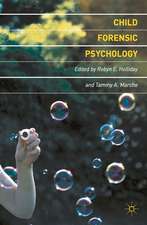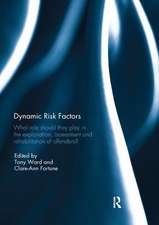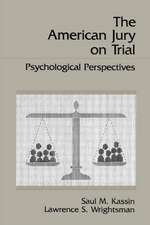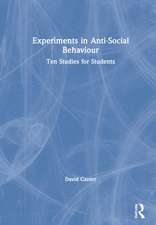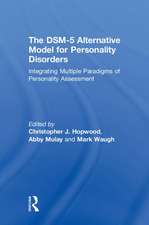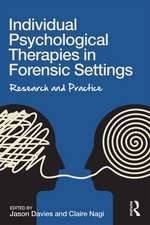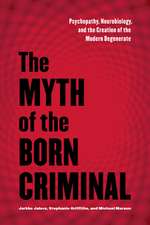Neurolaw: Advances in Neuroscience, Justice & Security: Palgrave Studies in Law, Neuroscience, and Human Behavior
Editat de Sjors Ligthart, Dave van Toor, Tijs Kooijmans, Thomas Douglas, Gerben Meynenen Limba Engleză Hardback – 6 mai 2021
This edited book provides an in-depth examination of the implications of neuroscience for the criminal justice system. It draws together experts from across law, neuroscience, medicine, psychology, criminology, and ethics, and offers an important contribution to current debates at the intersection of these fields. It examines how neuroscience might contribute to fair and more effective criminal justice systems, and how neuroscientific insights and information can be integrated into criminal law in a way that respects fundamental rights and moral values.
The book’s first part approaches these questions from a legal perspective, followed by ethical accounts in part two. Its authors address a wide range of topics and approaches: some more theoretical, like those regarding the foundations of punishment; others are more practical, like those concerning the use of brain scans in the courtroom. Together, they illustrate the thoroughly interdisciplinary nature of the debate, in which science, law and ethics are closely intertwined. It will appeal in particular to students and scholars of law, neuroscience, criminology, socio-legal studies and philosophy.
The book’s first part approaches these questions from a legal perspective, followed by ethical accounts in part two. Its authors address a wide range of topics and approaches: some more theoretical, like those regarding the foundations of punishment; others are more practical, like those concerning the use of brain scans in the courtroom. Together, they illustrate the thoroughly interdisciplinary nature of the debate, in which science, law and ethics are closely intertwined. It will appeal in particular to students and scholars of law, neuroscience, criminology, socio-legal studies and philosophy.
Chapter 8 is available open access under a Creative Commons Attribution 4.0 International License via link.springer.com.
| Toate formatele și edițiile | Preț | Express |
|---|---|---|
| Paperback (1) | 694.69 lei 6-8 săpt. | |
| Springer International Publishing – 7 mai 2022 | 694.69 lei 6-8 săpt. | |
| Hardback (1) | 527.59 lei 3 zile | |
| Springer International Publishing – 6 mai 2021 | 527.59 lei 3 zile |
Preț: 527.59 lei
Preț vechi: 579.78 lei
-9% Nou
Puncte Express: 791
Preț estimativ în valută:
100.95€ • 105.40$ • 83.55£
100.95€ • 105.40$ • 83.55£
Carte în stoc
Livrare din stoc 25 februarie
Preluare comenzi: 021 569.72.76
Specificații
ISBN-13: 9783030692766
ISBN-10: 3030692760
Pagini: 278
Ilustrații: XVII, 278 p.
Dimensiuni: 148 x 210 x 25 mm
Greutate: 0.51 kg
Ediția:1st ed. 2021
Editura: Springer International Publishing
Colecția Palgrave Macmillan
Seria Palgrave Studies in Law, Neuroscience, and Human Behavior
Locul publicării:Cham, Switzerland
ISBN-10: 3030692760
Pagini: 278
Ilustrații: XVII, 278 p.
Dimensiuni: 148 x 210 x 25 mm
Greutate: 0.51 kg
Ediția:1st ed. 2021
Editura: Springer International Publishing
Colecția Palgrave Macmillan
Seria Palgrave Studies in Law, Neuroscience, and Human Behavior
Locul publicării:Cham, Switzerland
Cuprins
1. Possibilities and limitations of neuroscience in the legal process.- 2. Νeuroscience and dangerousness evaluations: The effect of neuroscience evidence on Judges. Findings from a focus group study.- 3. The need for a partial defence of diminished capacity, and the potential role of the cognitive sciences in helping frame that defence.- 4. Coercion and control and excusing murder?.- 5. Reading the sleeping mind: Empirical and legal considerations.- 6. ‘Brain-reading’ in criminal justice and forensic psychiatry: Towards an integrative legal-ethical approach.- 7. A biopsychosocial approach to idiopathic versus acquired pedophilia: what do we know and how do we proceed legally and ethically?.- 8. Three rationales for a legal right to mental integrity.- 9. Neurointerventions and crime prevention: On ideal and non-ideal considerations.- 10. Neuroscience and the moral enhancement of offenders: The exceptionally good ‘brain’ as a thought experiment.- 11. Retributivism, consequentialism, and the role of science.
Notă biografică
Sjors Ligthart is PhD candidate in Criminal Law at Tilburg University, the Netherlands.
Dave van Toor is Assistant Professor of Criminal Law at Utrecht University, the Netherlands.
Tijs Kooijmans is Professor of Criminal Law at Tilburg University, the Netherlands.
Thomas Douglas is Professor of Applied Philosophy and Director of Research and Development at the Oxford Uehiro Centre of Practical Ethics, Faculty of Philosophy, and Senior Research Fellow at Jesus College, University of Oxford, UK.
Gerben Meynen is Professor of Forensic Psychiatry at Utrecht University and Professor of Ethics and Psychiatry at Vrije Universiteit Amsterdam, the Netherlands.
Dave van Toor is Assistant Professor of Criminal Law at Utrecht University, the Netherlands.
Tijs Kooijmans is Professor of Criminal Law at Tilburg University, the Netherlands.
Thomas Douglas is Professor of Applied Philosophy and Director of Research and Development at the Oxford Uehiro Centre of Practical Ethics, Faculty of Philosophy, and Senior Research Fellow at Jesus College, University of Oxford, UK.
Gerben Meynen is Professor of Forensic Psychiatry at Utrecht University and Professor of Ethics and Psychiatry at Vrije Universiteit Amsterdam, the Netherlands.
Textul de pe ultima copertă
This edited book provides an in-depth examination of the implications of neuroscience for the criminal justice system. It draws together experts from across law, neuroscience, medicine, psychology, criminology and ethics, and offers an important contribution to current debates at the intersection of these fields. The volume examines how neuroscience might contribute to fairer and more effective criminal justice systems, and how neuroscientific insights and information can be integrated into criminal law in a way that respects fundamental rights and moral values.
The book’s first part approaches these questions from a legal perspective, followed by ethical accounts in part two. The authors address a wide range of topics and approaches: some are more theoretical, like those regarding the foundations of punishment; others are more practical, like those concerning the use of brain scans in the courtroom. Together, they illustrate the thoroughly interdisciplinary nature of the debate, inwhich science, law and ethics are closely intertwined. This book will appeal in particular to students and scholars of law, neuroscience, criminology, socio-legal studies and philosophy.
Chapter 8 is available open access under a Creative Commons Attribution 4.0 International License via link.springer.com.
Sjors Ligthart is PhD candidate in Criminal Law at Tilburg University, the Netherlands.
Dave van Toor is Assistant Professor of Criminal Law at Utrecht University, the Netherlands.
Tijs Kooijmans is Professor of Criminal Law at Tilburg University, the Netherlands.
Thomas Douglas is Professor of Applied Philosophy and Director of Research and Development at the Oxford Uehiro Centre of Practical Ethics, Faculty of Philosophy, and Senior Research Fellow at Jesus College, University of Oxford, UK.
Gerben Meynen is Professor of Forensic Psychiatry at Utrecht University and Professor of Ethics and Psychiatry at Vrije Universiteit Amsterdam, the Netherlands.
Chapter 8 is available open access under a Creative Commons Attribution 4.0 International License via link.springer.com.
Sjors Ligthart is PhD candidate in Criminal Law at Tilburg University, the Netherlands.
Dave van Toor is Assistant Professor of Criminal Law at Utrecht University, the Netherlands.
Tijs Kooijmans is Professor of Criminal Law at Tilburg University, the Netherlands.
Thomas Douglas is Professor of Applied Philosophy and Director of Research and Development at the Oxford Uehiro Centre of Practical Ethics, Faculty of Philosophy, and Senior Research Fellow at Jesus College, University of Oxford, UK.
Gerben Meynen is Professor of Forensic Psychiatry at Utrecht University and Professor of Ethics and Psychiatry at Vrije Universiteit Amsterdam, the Netherlands.
Caracteristici
Provides an overview of the nascent field of Neurolaw Considers the reliability, interpretation, and risk of coercion of neuroscientific technologies within criminal justice Reviews the legal and ethical implications of using neuroscientific technologies in criminal proceedings
